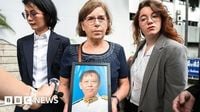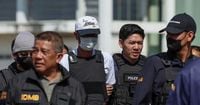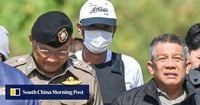In a case that has sent ripples through Southeast Asia’s political landscape, a Thai court has sentenced former marine Ekkalak Paenoi to life in prison for the brazen murder of Cambodian opposition politician Lim Kimya in Bangkok earlier this year. The ruling, delivered on October 3, 2025, capped a swift but emotionally charged trial that left many questions unanswered, particularly regarding the mastermind behind the killing.
Lim Kimya, a 74-year-old dual Cambodian and French citizen, was a longtime member of the Cambodia National Rescue Party (CNRP), the country’s most prominent opposition group until it was dissolved by court order in 2018 amid accusations of treason—a charge the party has always denied. On January 7, 2025, Lim arrived in Bangkok with his wife and brother, seeking respite from the mounting pressures back home. Just hours later, in the bustling old quarter near the famed Khaosan Road, he was gunned down in broad daylight.
According to Reuters, Ekkalak, 41, was arrested in neighboring Cambodia a day after the shooting and quickly confessed to the crime, even appearing in a livestreamed video. The Bangkok Criminal Court initially handed Ekkalak the death penalty for premeditated murder, but his confession and cooperation led to a commutation to life imprisonment. He was also found guilty of carrying and discharging a firearm in public, and ordered to pay more than 1.7 million baht (about $55,000) in compensation to Lim’s family.
Security camera footage from the day of the murder showed Ekkalak calmly parking his motorbike, removing his helmet, and walking across the street before firing three shots at Lim Kimya and fleeing. The killer’s face was visible and, according to the Associated Press, he left the scene as tourists and locals scattered in panic. Ekkalak then made his way across the border to Cambodia, where authorities apprehended him and extradited him back to Thailand.
The trial, which began with witness hearings on September 30, 2025, moved quickly. A second Thai national, Chakrit Buakhil, stood accused of driving Ekkalak to the Cambodian border after the shooting. However, the court acquitted Chakrit, citing insufficient evidence and noting, as his lawyer told AFP, that “he was only a driver and did not know what was happening.”
Two Cambodian nationals, Ly Ratanaksmey and Pich Kimsrin, remain at large after fleeing Thailand. Thai police believe one helped hire Ekkalak and the other assisted in identifying Lim Kimya as the target. Their continued absence has left the case incomplete, fueling suspicions and speculation about the true architects of the murder.
Lim Kimya’s widow, Anne-Marie Lim, attended the trial and, through her lawyer Nadthasiri Bergman, expressed mixed feelings about the verdict. “Anne-Marie is probably satisfied with today’s verdict, but she is still questioning who ordered the crime,” Bergman told reporters outside the court, as quoted by Reuters. “She wants authorities to get to the bottom of it.” The family’s legal team welcomed the conviction but called it “only one step in the investigation of the crime committed against Lim Kimya, as other suspects are still at large or unidentified, and they currently enjoy total impunity.”
The court refrained from offering any official conclusion about the motive or possible mastermind. Although some Thai media reported that Ekkalak was paid 60,000 baht (around $1,800) for the killing, police said he claimed not to have received payment, instead suggesting he took the job “to pay a debt of gratitude.” This ambiguity has done little to allay concerns that the murder was politically motivated.
The CNRP, to which Lim Kimya belonged, was once a formidable force in Cambodian politics. The party came close to unseating the ruling party of former Prime Minister Hun Sen in 2013. By 2017, Hun Sen’s government had accused the CNRP of plotting treason, leading to its dissolution and the barring of its members from political activity. Lim Kimya, like many opposition figures, became a vocal critic of the government, using his Facebook page to post messages critical of the regime.
After Hun Sen’s nearly four-decade rule, his son Hun Manet took the reins in August 2023. Despite hopes for reform, human rights groups and Western governments have continued to accuse Cambodian authorities of using the legal system to silence dissent. Hun Manet has publicly denied any government involvement in Lim Kimya’s assassination, as reported by BBC and Al Jazeera.
The killing has prompted renewed scrutiny of the dangers faced by political dissidents in Southeast Asia. According to BBC, dozens of activists fleeing repression in Cambodia, Vietnam, Laos, and Thailand have been sent back, disappeared, or killed in recent years. Human rights organizations suspect an unwritten agreement among these nations to allow each other’s security forces to pursue dissidents across borders, making sanctuary elusive.
“The actions of the first defendant caused harm to the plaintiff,” the Bangkok Criminal Court judge stated during sentencing, as quoted by Al Jazeera. “Since he confessed, the court reduced the sentence to life imprisonment.” Yet, the judge did not provide details about the killer’s motive or any higher-level orchestration.
The regional context is impossible to ignore. Thailand and Cambodia have a long and sometimes fraught relationship, with tensions flaring as recently as July 2025 during a border conflict that left at least 43 dead and displaced more than 300,000 people. The murder of a high-profile Cambodian opposition figure on Thai soil underscores the porousness of borders and the reach of political vendettas.
For Lim Kimya’s family, the verdict offers a measure of justice but little closure. The two Cambodian suspects remain fugitives, and the question of who ultimately ordered the assassination continues to haunt those closest to the victim. Lawyer Nadthasiri Bergman has called on Thai authorities to push harder for the extradition of the remaining suspects and to pursue the investigation until all responsible parties are held accountable.
As the dust settles on the trial, the broader implications for Southeast Asian dissidents are sobering. The case lays bare the persistent vulnerability of political opponents and the difficulties in securing justice when powerful interests are at play. While one gunman has been sentenced, the specter of impunity—and the fear it breeds—remains a stark reality for many in the region.
Ultimately, the court’s ruling has brought some measure of accountability, but the shadow of political violence and unanswered questions continues to loom large over both Cambodia and Thailand.



